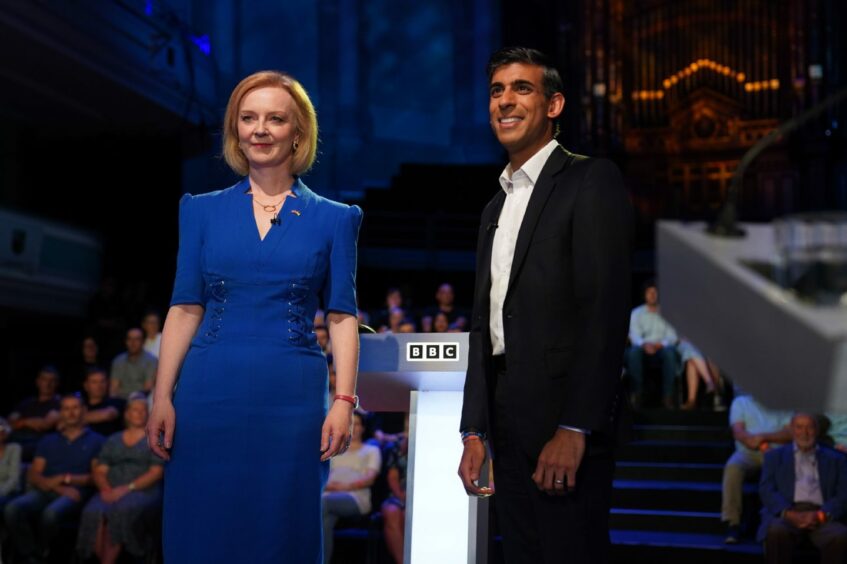
You know what they say? Be careful what you wish for.
In less than a month’s time, either Rishi Sunak or Liz Truss will emerge victorious from the hard-fought Conservative party leadership contest. But instead of a honeymoon period in which to settle in, they’ll step right in to one of the most challenging peacetime situations ever faced by a new UK prime minister.
As we swelter in the summer heatwave, it’s hard to contemplate just how serious an energy challenge awaits later this year. The public is already struggling with high fuel prices: petrol and diesel almost hit £2 per litre in July. Meanwhile, domestic utilities just keep rising with latest estimates exceeding £4,000 a year. Worse still, with Russia now turning the taps off on the EU’s gas supply, we might soon find ourselves caught up in the ensuing shortage. Cold showers cannot be ruled out.
Short-term fixes are in short supply. And long-term solutions are hard to agree upon let alone implement. But what could the new PM do next?
Tell it the way it is
For years, successive Westminster governments (Conservative and Labour) attempted to keep gas and electricity as cheap possible. But it’s now painfully clear that low bills can’t be delivered simply by creating price caps and more competition. As anyone who’s ever worked in the North Sea (gas or renewables) will tell you, energy projects are seriously expensive. Suppliers began failing last year and since the Ukraine invasion, we now face the grim combination of a worried public and an unreliable energy supply.
There are domestic solutions out there, from North Sea drilling to new-build nuclear. Yet, despite the dire situation, these are still running into stern opposition. This time, the new PM won’t have the option to back down. They’re going to have face down their critics with some hard truths: renewables, whilst useful, sadly can’t provide all the answers yet. And that well-intentioned, anti-nuclear Green policies have brought to Germany to the brink of disaster. But, like their predecessor, the new PM might find their toughest opposition lies within their own party. With Conservative MPs ranging from full-on climate enthusiasts to traditional sceptics, any changes to Boris Johnson’s ambitious commitments could be seen as either going too far or not far enough. But with the public fretting over bills, whoever wins, Net Zero could well be scaled back or re-framed in terms of jobs and infrastructure opportunities.
Ahead of this winter, we might also need a tough conversation with the public. Whilst the EU is already rolling out plans for reducing gas usage, the UK has previously dismissed the need for rationing. The National Grid is looking to incentivise lower peak-time usage but in a fast-changing situation, we could yet need restrictions, firstly on industry and, as a last resort, on the public. The UK government needs to be ready with a robust contingency plan. And, crucially, the PM has to be prepared to implement it (despite likely unpopularity) before we are engulfed in a crisis.
Think Ahead
Gas storage has sadly proven a textbook example of dangerous short-termism. Although closure of the Rough offshore facility in 2017 raised concerns, BEIS held that liquefied global shipments would compensate for falling North Sea production. Whilst the current crisis has forced Rough’s re-instatement, we are not out of the woods. The Ten Point Plan for a Green Industrial Revolution calls for a massive 40 GW of offshore wind. But whilst previous administrations have focussed on adding more turbines, it’s now time to catch up on complementary storage options (such as hydrogen) to back up fluctuating outputs.
Meanwhile, with both leadership contenders vowing to get tough on China, the winner needs to address the specific threats on the horizon. With the 2030 petrol ban looming, electric cars already account for almost 20% of UK sales. But whilst UK battery giga-factories are now taking shape, what of the raw materials that feed them? The US government is finally recognising that swapping Arabian crude for the Chinese-controlled lithium supply chain merely creates a new form of energy insecurity. In the UK, we need to start prioritising our “globally significant” reserves and establishing an efficient recycling sector. Plus developing alternatives, such as sustainable bio-fuels, for certain applications.
Seize the Moment
As Winston Churchill once noted, “never let a good crisis go to waste”. Whilst it’s a bit early for a new PM to contemplate their legacy, there’s no better way for Rishi or Liz to leave their mark than to ensure that Britain can better withstand future energy shocks. Responding to the seventies oil crisis, France implemented the Messmer Plan. This now sees France generate 70% of its power from some 50 nuclear reactors, all of which use French technology and are all French-owned. Of course, no policy is perfect: France over-built and the repair and decommissioning bills for the ageing fleet are substantial. But better their situation than Germany’s disastrous ditching of domestic nuclear for imported Russian gas.
The UK government’s Energy Security Strategy ambitiously targets 8 nuclear sign-offs by 2030. But Hinkley Point C remains unproven, unfinished and over budget. Whilst small modular reactors have been discussed for a while now, the market is now hotting up with many new concepts springing up globally. Notably, the French, stung by their vast over-runs (including Hinkley), are now targeting global SMR opportunities. The new PM needs to recognise this is a once in a generation opportunity for the UK to get back into the nuclear game. If we are not going to remain dependent upon imported technology, we need to fully back home-grown alternatives such as that offered by Rolls-Royce.
But it’s not all about mega-projects. The Energy Security Strategy said much that was positive about increasing domestic supply but was lighter on tackling demand. Un-sexy as it is, efficiency has to become a clear priority. This winter, the government will effectively be paying us to blast wasted heat out of our draughty homes. (And even those sizeable rebates are already looking insufficient.) Meanwhile, Germany’s latest Climate and Transformation Fund will commit some €60 billion on renovating buildings with a focus on improving the worst-performers (not replacing them) to ensure the best bang-for-buck. At long last, an energy policy from Berlin that the new PM might wish to emulate.
Sanjoy Sen CEng FIChemE is a chemical engineer with over 20 years’ industry experience.
He also holds an MSc in Petroleum Engineering and attained a distinction in his LLM in Oil & Gas Law from the University of Aberdeen where he considered a devolved Scotland’s future.
He spent four years in the Oil & Gas Authority as a Senior Development Engineer and was the Conservative general election candidate in Alyn & Deeside in 2019. He writes here in a personal capacity.
Recommended for you

 © Shutterstock
© Shutterstock